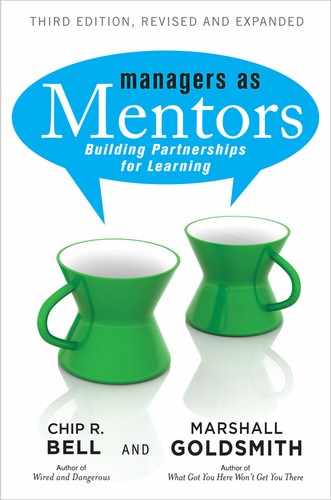Interpretation
The Mentor Scale is inspired by the FIRO-B®, an excellent instrument developed by Will Schutz and distributed exclusively by Consulting Psychologists Press, Mountain View, California (www.cpp.com).1 The scale measures—at one point in time—a mentor’s need for sociability, dominance, and openness, all crucial components of an effective mentoring relationship. (Schutz’s FIRO-B® instrument labels these components “inclusion,” “control,” and “affection,” respectively.)
Sociability has to do with your preference for being with or apart from others. People with high column A scores in sociability tend to be reserved loners; those with high column B scores tend to be outgoing joiners. People with similar numbers of A’s and B’s are neither highly sociable nor highly reserved; they can be moderately sociable or moderately reserved, depending on the situation.
What does sociability have to do with mentoring? People who have high sociability scores will find the rapport-building and dialogue-leading dimensions of mentoring easier. They will have to work hard to avoid dominating discussions. Low sociability scores are found among people whose reserve may make them a bit un-approachable. These people will need to work harder at helping protégés open up and communicate.
Dominance is about your preference regarding being in charge. People with high column A scores are comfortable having someone else do the leading and often prefer it. People with high column B scores tend to like being in control and often assert that need. Low dominance scores can also indicate a high need for independence. People with balanced scores are neither highly dominant nor highly submissive. They can control moderately or not at all, depending on the situation.
Dominance is a major issue in mentoring with a partnering philosophy. The whole concept of mentoring today is based on a relationship of shared power. High dominance scorers are reluctant either to give up control or to share control of the relationship; they have to work hard to listen rather than talk. Low dominance scorers, on the other hand, may need to work to assume leadership of the relationship. They may take such a low-key, laissez-faire approach that the protégé feels insecure and without guidance.
Openness refers to how easily you trust others. High column A scores are found among people who are cautious, guarded, and reluctant to show feelings. High column B scores are typical of people with many close relationships, who are comfortable being vulnerable and tend to express their feelings easily. People with similar A and B scores are moderately open or moderately cautious, depending on the situation.
High openness scorers will find it easy to reveal themselves in a mentoring relationship. In fact, their challenge is to be candid and open enough to encourage the protégé to do likewise, while not being so aggressive as to overwhelm or intimidate the protégé. Low openness scorers, however, will need to work at overcoming their caution in order to take early emotional and interpersonal risks with the protégé; their instinctive guardedness can make the protégé feel that mistakes might have dire consequences.
Several chapters ahead have sidebars addressing the implications of your Mentor Scale scores in terms of each chapter’s issues and challenges. The goal is to show you how to use your strengths and compensate for your weaknesses. Is it possible to be too sociable or too open? Of course! Is it not important in some situations to be highly dominant? Again, of course! For effective mentoring, however, our view is that you push toward the high side of sociability and openness, toward the low side of dominance.
Remember, the Mentor Scale gives you a reading at a moment in time, one that may change with the circumstances. Keep in mind also that the scale assesses only three aspects of your leadership personality. Don’t generalize the results beyond their intent; too often, personality instruments are used to label or categorize people, to discount their individual uniqueness. Learn from the Mentor Scale—but avoid using the results as though they were holy writ.
